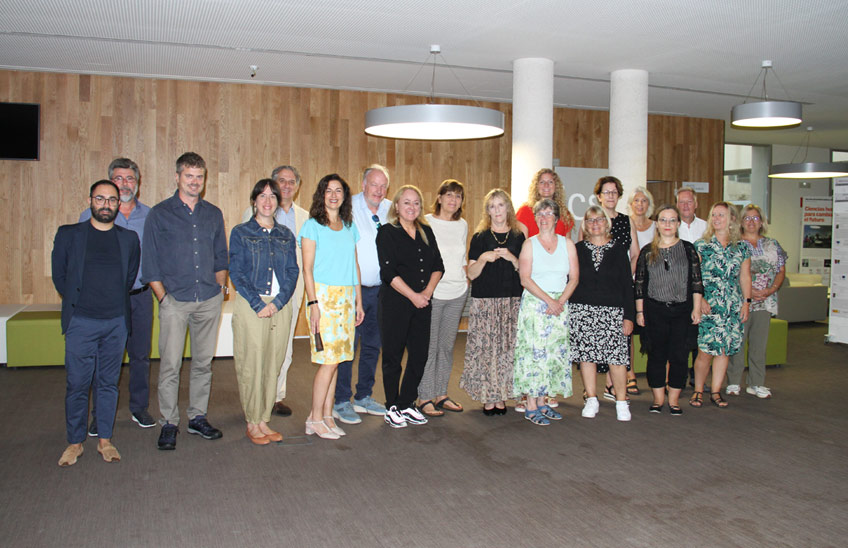Some twenty partners of the European project KiNESIS reflect at ICS on promote social innovation in the face of depopulation in rural areas.
Researchers from Germany, Spain, Estonia, Italy and the Netherlands shared the progress of the knowledge Alliance for Social Innovation in Areas at Risk of Depopulation and learned about rural wine and olive oil initiatives.

FotoIsabel Solana<br>/Participantes en el encuentro de KiNESIS Network en la Universidad de Navarra
14 | 09 | 2023
S ome twenty partners of the knowledge Alliance for Social Innovation in Ar eas at Risk of Depopulation (KiNESIS) from Germany, Spain, Estonia, Italy and the Netherlands visited the ICS of the University of Navarra to share the progress of . Institute for Culture and Society (ICS) of the University of Navarra to share the progress of project.
Also, participants have known closely the project Vivid, in San Martin de Unx, a laboratory innovation around wine, viticulture and depopulation; and Biosasun, on the road to Allo-Arróniz, an organic olive oil company dedicated to innovation and research that develops other products within the food industry and health.
The coordinator of the partnership, Johanna Monti, professor at the University of Naples L'Orientale (Italy), emphasized that one of the main contributions of project is the involvement of students through internships. "We have managed to involve communities through cooperation between universities, NGOs, municipalities and private citizens. This is how we are generating social innovation," he said.
"Through internships we are directing young people to different communities and helping them think about how they can improve their environment. They are generating digital content and proposing initiatives through hackathons, for example," he added. "All of this is the engine to make a real impact."
Labor market mismatches
For her part, Elles Bulder, professor at the Hanze University of Applied Sciences in Groningen (The Netherlands), commented that one of the main problems of depopulation in rural areas is the lack of young people, which, among other effects, produces imbalances in the labor market.
"There are no young people who can become position businesses. Not only are there services disappearing, but new ones are not being started up. In this way, the system can end up collapsing," he warned.
The expert added that, in terms of habitability and quality of life in rural areas, it is important to reflect on which people still live there and their needs, as well as to be able to attract "new blood that brings new energy, new ideas".
Professor Bulder pointed out that in many areas of Europe, initiatives are emerging from volunteer activities to provide solutions, such as accompanying the elderly to stores or health services, and informal care for neighbors. "However, it is necessary to combine voluntary input with professional input," she said.
"In the European perspective we can learn a lot from each other about how to organize and maintain the service infrastructure in good shape so that it is valuable to the people in those areas who don't want to leave," he concluded.
KiNESIS is a project co-funded by the Erasmus+ Program of the European Commission. It addresses depopulation with new, innovative and multidisciplinary approaches, which are applied in teaching and learning. To do so, it relies on the creation of a network of exchange, flow and co-creation of knowledge at local and global level.
It is coordinated in the Comunidad Foral by the researchers Ruth Breeze and Ana María Fernández Vallejo, from the group 'Public discourse' of the Institute for Culture and Society (ICS) of the University of Navarra. The Observatorio de la Realidad Social del department de Derechos Sociales del Gobierno de Navarra and Cederna Garalur are also partners.
